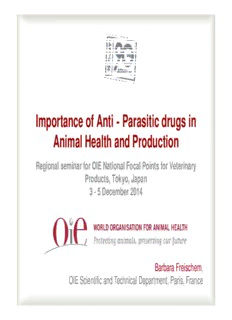
Importance of Anti Parasitic drugs in Animal Health and PDF
Preview Importance of Anti Parasitic drugs in Animal Health and
Importance of Anti‐Parasitic drugs in Animal Health and Production Regional seminar for OIE National Focal Points for Veterinary Products, Tokyo, Japan 3 - 5 December 2014 Barbara Freischem, OIE Scientific and Technical Department, Paris, France 1 Content • Introduction • Spectrum of parasites • Economic relevance of parasites • Parasite control and economic impact 22 Introduction Parasitism: A two-species association in which one species, the parasite, lives on or in a second species, the host, for a significant period of its life and obtains nourishment from it. • Important features of the host-parasite relationship: • Parasitism always involves two species, parasite and host. • Many parasitic associations produce pathological changes in hosts that may result in disease. • Successful treatment and control of parasitic diseases requires not only comprehensive information about the parasite itself but also a good understanding of the nature of parasites' interactions with their hosts. • The parasite is always the beneficiary and the host is always the provider in any host-parasite relationship. Source: Parasites and Parasitic Diseases of Domestic Animals Dr.Colin Johnstone(principal author) Copyright © 1998 University of Pennsylvania 33 Introduction Traditionally regarded as parasites: • protozoa, arthropods, helminths Broader definition of parasites: • all infectious agents of animals, i.e. viruses, bacteria and fungi as well as the arthropods, helminths and protozoa; can be further divided into microparasites and macroparasites Source: Parasites and Parasitic Diseases of Domestic Animals Dr.Colin Johnstone(principal author) Copyright © 1998 University of Pennsylvania 44 Spectrum of Parasites A female mosquito blood feeding. A cluster of nematodes, the Mosquitoes serve as intermediate roundworm of dogs, Toxocara canis. hosts of other parasites such as This parasite is common in puppies Dirofilaria immitis the dog and cat and may be transmitted transplacen- heartworm and Plasmodium species tally as well as to nursing pups in their causing malaria in humans and birds. mother's milk. This parasite has They are also vectors of viruses public health importance as a cause causing yellow fever and encephalitis. of visceral larva migrans in man. Source: Parasites and Parasitic Diseases of Domestic Animals Dr.Colin Johnstone(principal author) Copyright © 1998 University of Pennsylvania 5 Spectrum of Parasites Fleas are common parasites of dogs Fasciola hepatica, the liver fluke of and cats. They bite their hosts and ruminants. The parasite has a feed on blood. Fleas are intermediate complex life cycle involving snail hosts of the tapeworm Dipylidium intermediate hosts. Migration of caninum and the filarid nematode developing flukes in the host liver Dipetalonema reconditum. The cat provokes an intense inflammatory flea is a vector of feline parvovirus. reaction with severe liver damage. Source: Parasites and Parasitic Diseases of Domestic Animals Dr.Colin Johnstone(principal author) Copyright © 1998 University of Pennsylvania 6 Spectrum of Parasites Hematopinus suis, the blood-sucking Anoplocephala perfoliata, a tapeworm louse of swine is common in pigs of horses, is often found in clusters at raised indoors with transmission the ileo-cecal junction. It is widespread readily occurring from pig to pig. in distribution and usually benign. Infested pigs are restless and rub their However, cecal abscesses, and skin frequently to relieve the itching. intussusceptions have been reported. Source: Parasites and Parasitic Diseases of Domestic Animals Dr.Colin Johnstone(principal author) Copyright © 1998 University of Pennsylvania 7 Spectrum of Parasites The nematode Dirofilaria immitis, The protozoan Giardia is important the heartworm has a complex life as a cause of diarrhea in dogs and cycle involving mosquitoes as cattle but is also found in other intermediate hosts. These worms are domestic animals as well as man. The found in the cardio-pulmonary trophozoite stage, shown here, circulation and may cause severe attaches to the mucous epithelium heart disease in dogs and cats. cells of the small intestine. Source: Parasites and Parasitic Diseases of Domestic Animals Dr.Colin Johnstone(principal author) Copyright © 1998 University of Pennsylvania 8 Spectrum of parasites Parasites in fish include external parasites Sea lice are marine ectoparasites (shown above: isopod Anilocra gigantea), (external parasites) that feed on the leeches, nematodes, cestodes, flukes, mucus, epidermal tissue, and blood of carp lice and salmon (sea) lice. host marine fish. Lepeophtheirus Tetracapsuloides bryosalmonae, a salmonis and various Caligus species myxozoan parasite causes Proliferative are adapted to saltwater and are major kidney disease (PKD) in salmonids. ectoparasites of farmed and wild Atlantic salmon. Several antiparasitic drugs have been developed for control purposes. 9 Spectrum of Parasites Not all parasites are equally parasitic – parasitism can be seen as a spectrum • Free living, seeking a host only to feed • Cannot survive without a host at any stage of their life cycles Source: Parasites and Parasitic Diseases of Domestic Animals Dr.Colin Johnstone(principal author) Copyright © 1998 University of Pennsylvania 10
Description: